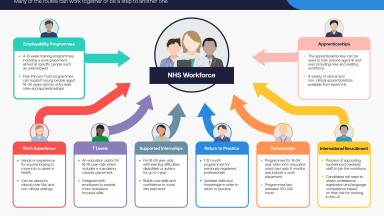Education and training
Our resources can help you navigate the range of training options and provide you with guidance to support your existing and future workforce.
Our resources provide information on various educational and training opportunities, including apprenticeships, T Levels, and specialised nurse education.
Learn how these routes can help you build a skilled and dedicated team, equipped to meet the evolving demands of the healthcare sector. If you’re looking to upskill your current staff or attract new talent, these tools will help support your workforce development goals.
Explore the different routes to train and recruit your workforce, including information about apprenticeships, T Levels, nurse education and more.














